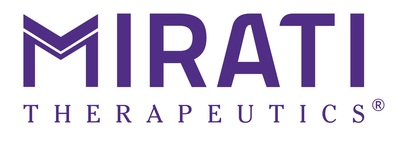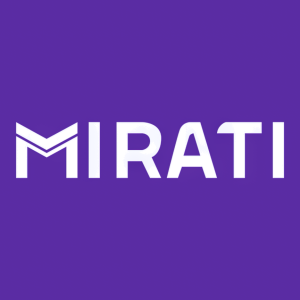Mirati Therapeutics Presents Positive Clinical Data with Investigational Adagrasib as Monotherapy and in Combination with Cetuximab in Patients with KRAS G12C-Mutated Colorectal Cancer
Mirati Therapeutics (NASDAQ: MRTX) announced positive results from the Phase 1/2 KRYSTAL-1 study of adagrasib in patients with KRASG12C-mutated colorectal cancer. The monotherapy arm showed a response rate of 22% and a disease control rate of 87%. In combination with cetuximab, the response rate rose to 43%, with 100% disease control in evaluable patients. The study demonstrated a manageable safety profile with no Grade 5 treatment-related adverse events. These findings will support further evaluation in ongoing studies, including a Phase 3 trial.
- Adagrasib monotherapy achieved a 22% response rate and 87% disease control rate.
- Combination therapy with cetuximab showed a 43% response rate with 100% disease control.
- Ongoing Phase 3 trial aims to compare adagrasib with standard chemotherapy, indicating potential market expansion.
- None.
Insights
Analyzing...
SAN DIEGO, Sept. 19, 2021 /PRNewswire/ -- Mirati Therapeutics, Inc. (NASDAQ: MRTX), a clinical-stage targeted oncology company, today announced results from a cohort of the Phase 1/2 KRYSTAL–1 study evaluating adagrasib at the 600mg BID dose as both monotherapy and in combination with cetuximab in patients with heavily pretreated colorectal cancer harboring a KRASG12C mutation. Results showed that adagrasib alone and with cetuximab demonstrated significant clinical activity and broad disease control in these patients. The findings (Abstract # LBA6) will be presented today at 9:47 a.m. ET as a late-breaking oral presentation during the Presidential Symposium II session at the European Society for Medical Oncology Congress (ESMO) 2021.
"Patients living with KRAS-mutated colorectal cancer face a significant medical need for new treatment options," said Dr. Jared Weiss M.D., lead study investigator and associate professor of medicine, division of oncology at University of North Carolina-Chapel Hill. "The positive results presented today show that adagrasib alone or in combination with cetuximab may improve clinical outcomes in patients with colorectal cancer harboring a KRASG12C mutation."
Summary of Clinical Results
- As of May 25, 2021,
80% of patients enrolled in the adagrasib monotherapy arm (n=46) received at least two prior lines of systemic anticancer therapies, and had a median follow up of 8.9 months. Of the evaluable patients (n=45), results showed an investigator assessed response rate (RR) of22% , including one unconfirmed partial response (PR), and a disease control rate (DCR) of87% ; the median duration of response (DOR) was 4.2 months. In all enrolled patients, the median progression free survival (PFS) was 5.6 months (95% Confidence Interval, CI: 4.1,8.3). - As of July 9, 2021,
90% patients enrolled in the adagrasib plus cetuximab arm (n=32) received at least two prior lines of systemic anticancer therapies, and had a median follow up of 7 months. Of the evaluable patients (n=28), results showed an investigator assessed RR of43% , including two unconfirmed PRs and a DCR rate of100% . After the data cutoff date, of the two unconfirmed PRs, follow up scans showed one patient had a confirmed PR, and the second patient progressed. At the time of the analysis,63% (20/32) of enrolled patients remained on treatment. - Adagrasib monotherapy and in combination with cetuximab was well-tolerated in this study, with a manageable safety profile. Grade 3/4 treatment related adverse events (TRAEs) were observed in
30% of patients treated with adagrasib alone, and in16% of patients treated with the combination. Treatment related adverse events led to treatment discontinuation in6% of patients who received combination therapy and in none (0% ) of those who received adagrasib monotherapy. No Grade 5 TRAEs were observed in either treatment arm.
"Adagrasib represents Mirati's scientific commitment to the discovery and development of novel targets that may lead to new treatment options for people with cancer," said Charles M. Baum, M.D., Ph.D., president and chief executive officer, Mirati Therapeutics, Inc. "The results presented at ESMO support further study of adagrasib in KRAS-mutated colon cancer, including with our ongoing, global registrational Phase 3 trial, KRYSTAL–10, comparing adagrasib plus cetuximab to standard of care chemotherapy in second-line KRASG12C-mutated colorectal cancer."
Virtual Investor Event
Mirati Therapeutics will host a virtual Investor Event on Monday, September 20, 2021 at 8:30 a.m. ET / 5:30 a.m. PT.
Company executives will discuss:
- A top-line update from the Phase 2 registrational cohort of the KRYSTAL-1 study evaluating adagrasib in previously-treated patients with KRASG12C-mutated non-small cell lung cancer (NSCLC)
- Findings from the CRC cohort of the Phase 1/2 KRYSTAL-1 study evaluating adagrasib as monotherapy and in combination with cetuximab in patients with heavily pretreated CRC harboring the KRASG12C mutation, as presented at the 2021 ESMO Congress
- Results from the Phase 2 MRTX-500 study evaluating sitravatinib combined with nivolumab in patients with non-squamous NSCLC who progressed on or after prior checkpoint inhibitor therapy, to be presented at the 2021 ESMO Congress
Investors and the general public are invited to register and listen to a live webcast of the event through the "Investors and Media" section on Mirati.com. A replay of the event will be available shortly after the conclusion of the event.
About the KRYSTAL-1 Study
KRYSTAL–1 is an open-label Phase 1/2 multiple expansion cohort trial evaluating adagrasib as monotherapy and in combination with other anticancer therapies in patients with advanced solid tumors harboring a KRASG12C mutation.
About Adagrasib (MRTX849)
Adagrasib is an investigational, highly selective, and potent oral small-molecule inhibitor of KRASG12C that is optimized to sustain target inhibition, an attribute that could be important to treat KRASG12C-mutated cancers, as the KRASG12C protein regenerates every 24−48 hours. Adagrasib is a being evaluated as monotherapy and in combination with other anti-cancer therapies in patients with advanced KRASG12C-mutated solid tumors, including non-small cell lung cancer (NSCLC), colorectal cancer and pancreatic cancer. For more information visit Mirati.com/science.
About Mirati Therapeutics, Inc.
Mirati Therapeutics, Inc. is a clinical-stage biotechnology company whose mission is to discover, design and deliver breakthrough therapies to transform the lives of patients with cancer and their loved ones. The company is relentlessly focused on bringing forward therapies that address areas of high unmet need, including lung cancer, and advancing a pipeline of novel therapeutics targeting the genetic and immunological drivers of cancer. Mirati is using its scientific expertise to develop novel solutions in two registration-enabling programs: adagrasib (MRTX849), an investigational small molecule, potent and selective KRASG12C inhibitor, as monotherapy and in combination with other agents, and sitravatinib, an investigational spectrum-selective inhibitor of receptor tyrosine kinases in combination with checkpoint inhibitor therapies. Mirati is also advancing its differentiated preclinical portfolio, including MRTX1133, an investigational KRASG12D inhibitor, MRTX1719, an investigational PRMT5 inhibitor, and other oncology discovery programs. Unified for patients, Mirati's vision is to unlock the science behind the promise of a life beyond cancer.
For more information about Mirati Therapeutics, visit us at Mirati.com or follow us on Twitter and LinkedIn.
Forward Looking Statements
This press release contains forward-looking statements regarding the business of Mirati Therapeutics, Inc. ("Mirati"). Any statement describing Mirati's goals, expectations, financial or other projections, intentions or beliefs, development plans and the commercial potential of Mirati's drug development pipeline, including without limitation adagrasib (MRTX849), sitravatinib, MRTX1719 and MRTX1133, is a forward-looking statement and should be considered an at-risk statement. Such statements are subject to risks and uncertainties, particularly those challenges inherent in the process of discovering, developing and commercialization of new drug products that are safe and effective for use as human therapeutics, and in the endeavor of building a business around such drugs.
Mirati's forward-looking statements also involve assumptions that, if they never materialize or prove correct, could cause its results to differ materially from those expressed or implied by such forward-looking statements. Although Mirati's forward-looking statements reflect the good faith judgment of its management, these statements are based only on facts and factors currently known by Mirati. As a result, you are cautioned not to rely on these forward-looking statements. These and other risks concerning Mirati's programs are described in additional detail in Mirati's quarterly reports on Form 10-Q and annual reports on Form 10-K, which are on file with the U.S. Securities and Exchange Commission (the "SEC") available at the SEC's Internet site (www.sec.gov).These forward-looking statements are made as of the date of this press release, and Mirati assumes no obligation to update the forward-looking statements, or to update the reasons why actual results could differ from those projected in the forward-looking statements, except as required by law.
Mirati Contacts
Investor Relations: Temre Johnson | 858-332-3562 | ir@mirati.com
Media Relations: Priyanka Shah | 908-447-6134 | media@mirati.com
![]() View original content to download multimedia:https://www.prnewswire.com/news-releases/mirati-therapeutics-presents-positive-clinical-data-with-investigational-adagrasib-as-monotherapy-and-in-combination-with-cetuximab-in-patients-with-kras-g12c-mutated-colorectal-cancer-301379950.html
View original content to download multimedia:https://www.prnewswire.com/news-releases/mirati-therapeutics-presents-positive-clinical-data-with-investigational-adagrasib-as-monotherapy-and-in-combination-with-cetuximab-in-patients-with-kras-g12c-mutated-colorectal-cancer-301379950.html
SOURCE Mirati Therapeutics, Inc.








